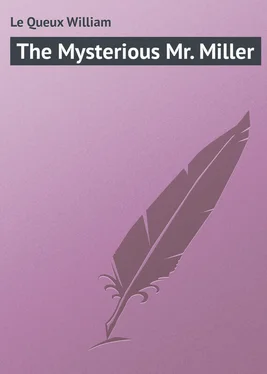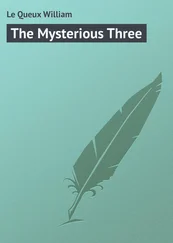William Le Queux - The Mysterious Mr. Miller
Здесь есть возможность читать онлайн «William Le Queux - The Mysterious Mr. Miller» — ознакомительный отрывок электронной книги совершенно бесплатно, а после прочтения отрывка купить полную версию. В некоторых случаях можно слушать аудио, скачать через торрент в формате fb2 и присутствует краткое содержание. Жанр: foreign_prose, на английском языке. Описание произведения, (предисловие) а так же отзывы посетителей доступны на портале библиотеки ЛибКат.
- Название:The Mysterious Mr. Miller
- Автор:
- Жанр:
- Год:неизвестен
- ISBN:нет данных
- Рейтинг книги:5 / 5. Голосов: 1
-
Избранное:Добавить в избранное
- Отзывы:
-
Ваша оценка:
- 100
- 1
- 2
- 3
- 4
- 5
The Mysterious Mr. Miller: краткое содержание, описание и аннотация
Предлагаем к чтению аннотацию, описание, краткое содержание или предисловие (зависит от того, что написал сам автор книги «The Mysterious Mr. Miller»). Если вы не нашли необходимую информацию о книге — напишите в комментариях, мы постараемся отыскать её.
The Mysterious Mr. Miller — читать онлайн ознакомительный отрывок
Ниже представлен текст книги, разбитый по страницам. Система сохранения места последней прочитанной страницы, позволяет с удобством читать онлайн бесплатно книгу «The Mysterious Mr. Miller», без необходимости каждый раз заново искать на чём Вы остановились. Поставьте закладку, и сможете в любой момент перейти на страницу, на которой закончили чтение.
Интервал:
Закладка:
The police record gave Miller’s place of birth as Studland, in Dorsetshire, therefore I began to wonder whether, if I went there, I should be able to discover any of the family. Surely somebody would know some facts concerning the family. From the Gazetteer I discovered that the place was a small village on the sea, not far from Swanage, and on the following morning, without saying anything to Sammy, I took train from Waterloo. At Swanage I hired a fly from that hotel which faces the bay so pleasantly with grounds sloping to the water, and an hour later I descended at the inn in Studland village.
It was a quiet, quaint old-world place, I found, with a queer ancient little church hidden away among the trees at the back. In the bar-parlour of the “Lion” I ordered some tea, and then, in the course of a chat with the stout, cheery old publican I casually inquired after some friends of mine named Miller.
“Oh! yes,” he said. “Old Miss Miller lives ’ere still – at the Manor ’Ouse just beyond the village. You passed it just before you came down the hill from Swanage way. They’re one of the oldest families ’ere in Studland. One of the Millers – Sir Roger ’e was called – was governor of Corfe Castle under Queen Elizabeth, so I’ve ’eard say.”
“Then the Millers have always lived at the Manor?” I remarked.
“Of course. The property really belongs to Mr James, but ’e’s always abroad, so ’is sister, old Miss Catherine, lives in the ’ouse and looks after it.”
“Is this Mr Miller named James Harding Miller?” I asked.
“Yes. That’s ’im. They calls ’im the mysterious Mr Miller. ’E always was a wild rascal when ’e wor a boy, they say. The old gentleman could do nothing with him, so ’e was sent abroad, and has lived there mostly ever since.”
“Has he any children?”
“A girl. The servants at the Manor talk a lot about ’er, and say she’s very nice. She’s often ’ere.”
“He’s well off, I suppose?”
“Oh, dear no, sir,” declared the innkeeper. “The Millers are as poor as church mice. The value of land’s gone down so of late years. The old place is mortgaged up to the hilt to some Jews in London, an’ it’s a pity – a thousand pities.”
All this, together with other facts and gossip which the garrulous old fellow revealed to me, was of extreme interest, and I congratulated myself upon the success of my first investigation.
“When did you last see that mysterious Mr Miller, as you call him?”
“Oh! It’s a long time now ’e ’aven’t been in Studland. Once, about three years ago, ’e came without any luggage they say – and stayed over a twelvemonth. ’E’s a queer man. ’E never speaks to the likes of us.”
I resolved to act boldly and call upon old Miss Miller and inquire after her niece. Therefore I went out and up the hill in the bright sunshine until I came to the old and rather tumble-down lodge gate, and then, after walking a short distance up the drive, I came within sight of a large old Elizabethan mansion, long and rambling and time-mellowed – a typical English home surrounded by great trees in the centre of a small park.
A neat maid answered my summons, and I was at once ushered into a quaint old oak-panelled room off the hall, the furniture of which was undoubtedly Elizabethan, with rich old brocades dropping to pieces with age. I examined everything with interest, and then walked to the deep diamond-paned window and was looking across the park admiring the delightful vista when, of a sudden, I heard a movement behind me, and turning, confronted a tall, thin, dark-haired man, slightly grey, with bony features, a pair of sharp, closely-set eyes and scraggy brown beard. He was dressed in dark grey tweeds, and wore white spats over his boots.
“Mr Leaf?” he inquired, glancing at the card I had sent in. “I am Miss Miller’s brother,” he explained. “My name is James Harding Miller. Do you wish to see my sister very urgently? She has a headache, and has sent me to make her apologies.”
I started when he introduced himself.
I was actually face to face with the ingenious scoundrel whom Sammy had denounced, and whom the Italian police so strongly suspected to be the leader of one of the cleverest gangs of malefactors in Europe.
Chapter Nine
Contains a Surprise
James Harding Miller was a thoroughgoing cosmopolitan of most gentlemanly exterior. His grey face was deeply lined and bore that curious washed-out look of a man who had lived many years in a hot climate. After ten years or so the fiery Italian sun no longer tans the face of the northerner, but on the contrary his hair goes prematurely grey, and each year as the burning summer comes he is less able to withstand the heat of the “lion” days. His leanness, his foreign-cut clothes, and the slight gesticulation as he spoke all showed him to be a man more at home in the bright Italian land of song and sunlight than there, in an English village, the proprietor of that charming old home of his honourable ancestors.
In reply to his question I was rather evasive, saying that I happened to be in Swanage, and had driven out to pay a complimentary call upon his sister. She was not to put herself out of the way in the least, I urged. I should remain in Swanage for some days and hoped to have the pleasure of calling again.
Then turning and glancing around, I exclaimed: – “What a delightful old room! To me it is a real pleasure to enter a thoroughly English home, as this is.”
“Why?” he inquired, eyeing me with some surprise. “Because I live almost always on the Continent, and after a time foreign life and foreign ways jar upon the Englishman. At least I’ve found it so.”
“Ah!” He sighed, rather heavily I thought. “And I, too, have found it so. I quite agree with you. One may travel the world over, as I have done these past twenty years, yet there’s no place like our much-abused old England, after all.”
“Oh, then you’ve been a rolling stone, like myself,” I remarked, delighted at the success of my ruse.
“Yes. And I still am,” was his answer, given rather sadly. “Ever since my poor wife’s death, now nearly twenty years ago, I’ve been a wanderer. This place is mine, but I’m scarcely ever here. Why? I can’t for the life of me tell you. I’ve tried to settle down, but cannot. After a week here in this quiet rural dulness, the old fever sets up in my blood, a longing for action, a longing to go south to Italy – the country which seems to hold me in a kind of magnetism which I have never been able to resist.”
“And I, too, love Italy,” I said. “Is it not strange that most of us who have lived any length of time in that country of blossoming magnolias and gentle vines always desire to return to it. We may abuse its defects, we may revile its people as dishonest idlers, we may execrate its snail-like railways and run down its primitive hotels, yet all the same we have a secret longing to return to that glowing land where life is love, where art is in the very atmosphere, where the sun brings gladness to the heaviest heart, and the night silence is broken by love stornelli and the mandoline.”
“You are right,” he said, gazing straight out of the old leaded window and speaking almost as though to himself. “Byron found it so, Shelley, Smollet, Trollope, the Brownings and hosts of others. They were fascinated by the fatal beauty of Italy – just as a man is so often drawn to his doom by the face of a beautiful woman. And after all we are but straws on the winds of the hour.”
Then, turning to a cabinet, I bent and admired a fine old Lowestoft tea-set and a collection of old blue posset-pots, whereupon he said: —
“Ah! I see you are interested in antiques. Do you care for pictures? I have one or two.”
Читать дальшеИнтервал:
Закладка:
Похожие книги на «The Mysterious Mr. Miller»
Представляем Вашему вниманию похожие книги на «The Mysterious Mr. Miller» списком для выбора. Мы отобрали схожую по названию и смыслу литературу в надежде предоставить читателям больше вариантов отыскать новые, интересные, ещё непрочитанные произведения.
Обсуждение, отзывы о книге «The Mysterious Mr. Miller» и просто собственные мнения читателей. Оставьте ваши комментарии, напишите, что Вы думаете о произведении, его смысле или главных героях. Укажите что конкретно понравилось, а что нет, и почему Вы так считаете.












